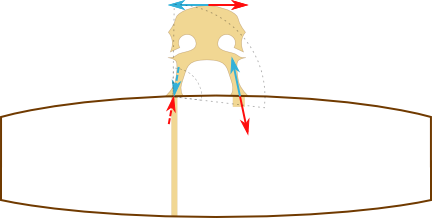The kid’s gotten interested in playing music and has been trying out various instruments over the last few months. (Yay for rentals!)
The latest is cello. As soon as he heard Bach’s cello suites, he was convinced.
We lined up lessons with the same teacher he’d had for violin earlier this year. Then we went to a music shop to measure what size he needed and rent a cello.
Only one problem: when we got it home he noticed the bridge was tilted instead of perpendicular to the body of the cello. He can replace a string just fine — he actually had to replace the E string on the rental violin when it snapped during tuning — but we all agreed to wait until his first lesson and let the teacher adjust it. It’s held in place entirely by the tension of the strings, and not something that they recommend beginners mess with.
He had his first lesson a few days later. The first order of business was to adjust the bridge. So she started carefully loosening the strings while holding the bridge until she could shift it into place. And as soon as it moved, we all heard a loud *THUNK* from inside the cello.
“Oh no!” the kid said. “SOUND POST!” And we all looked at each other in sudden horror.
Wait, what’s a sound post?
The sound post is inside the body of the violin or cello, connecting the top and bottom. (Or front and back, I suppose.) I wasn’t sure exactly what it did aside from maybe structural support, but I knew it shouldn’t be rattling around in there, and it was clearly not something that could be fixed on the spot.
And they were both certain that you couldn’t play the instrument without it.
I looked up its acoustic function: the sound post is aligned with one end of the bridge to provide a fulcrum for the bridge to vibrate around. This causes the bridge to transmit the sideways vibrations of the strings (constrained by the bow pressing on them) to vertical vibrations in the body, making it actually sound good. Plucked instruments like guitars don’t need that because the strings can vibrate in all directions.

So you definitely wouldn’t want that to be missing.
Or rattling around inside the cello.
Plan B
The teacher immediately had to retool the lesson. He couldn’t play the instrument we’d brought. And he couldn’t play her full-size cello. So she introduced him to reading bass clef and some of the basics of how violin and cello differ, and assigned some practice lessons, just in case.
Amazingly, we were able to make it to the music shop in time to swap it for another one that same day. It was half an hour to closing, and could easily take anywhere from 15-45 minutes to get there depending on traffic. And it was a weekday at 5:30. We made it there with 10 minutes to spare!


